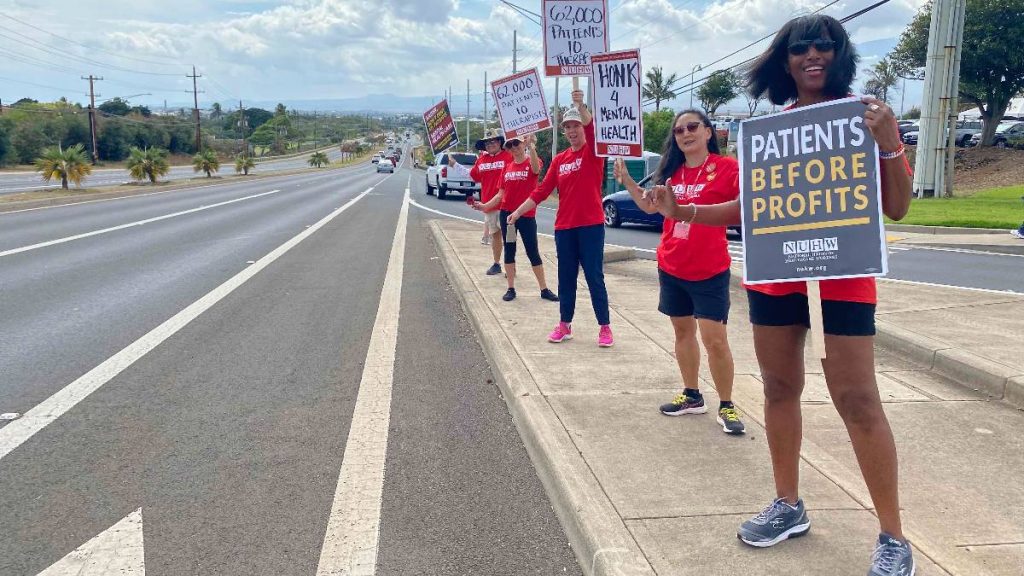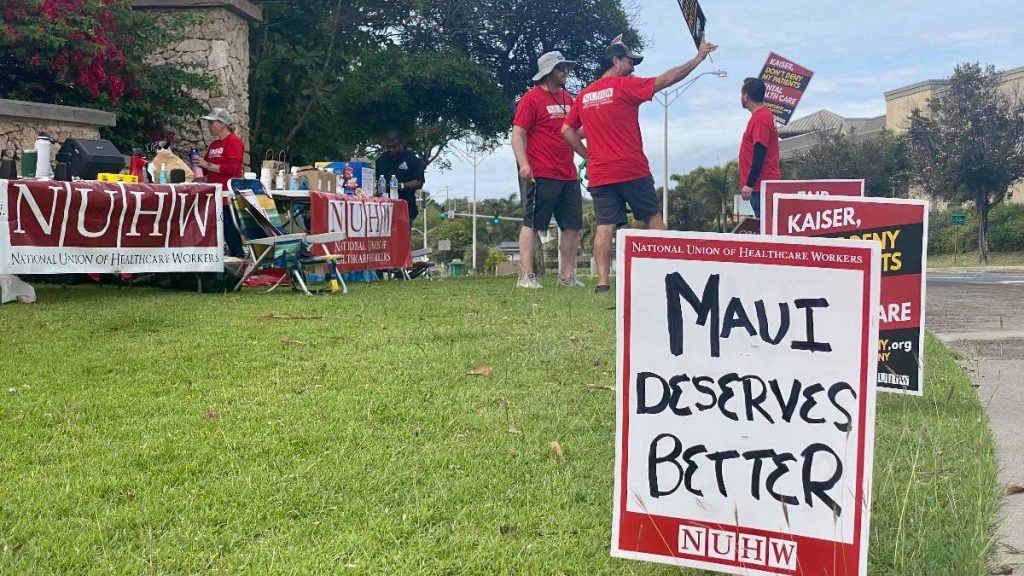Kaiser mental health clinicians during Maui strike: ‘They pushed us to this’


Rachel Kaya, a Maui psychologist, said it’s out of the ordinary to see mental health clinicians yelling, waving signs, ringing bells and pounding the pavement.
“We are the calm, nice, let-me-listen-to-you people — it’s very unusual for us to do this,” she told Maui Now this morning. “You know it’s extreme for us to have to stand on the streets — but they pushed us to it.”
Kaya, who works at Kaiser Permanente Maui Lani clinic, is part of a statewide strike by Kaiser mental health clinicians to draw attention to the HMO’s severe mental health staffing shortages that’s leaving Hawai’i patients with dangerously long wait times and poor care.
Signs that read “Patients before profits,” “Honk for mental health,” “62,000 patients to 10 therapists,” “4 years, 31x bargaining, 0 contract,” and “Maui deserves better,” were highlighted during the strike outside Maui Lani clinic today. Vehicles honked horns as clinicians waved and rattled cowbells.
The three-day strike started at Honolulu and Kona clinics Thursday, moved to Maui and another Honolulu clinic today, and will end Friday at a Waipahu clinic.
Organized by the National Union of Healthcare Workers that represents Hawai’i Kaiser’s 58 mental health providers, the demonstration is being called the Aloha State’s largest mental health strike.
Kaiser Permanente Hawaiʻi, meanwhile, called the strike a bargaining tactic, labeling the move as “unfortunate” and “unwarranted.”
A news release apologized for possible patient disruptions and defended the HMO’s operations, pointing to nationwide staffing shortages.
“It is especially disappointing that the union is asking our dedicated and compassionate employees to walk away from their patients,” Kaiser said in the statement.
The union, though, said that no patient appointments have been scheduled during the strike.
Mental health clinicians rallying on Maui said that anxiety, depression, post-traumatic stress disorder and other conditions have spiked since the pandemic. But it can take patients months to get help.
“If anybody called Kaiser today and wanted to get a first-time appointment, that first-time appointment would be plus-two months away,” Kaya said. “And that’s even if you can get through on the phone call.”
Grief due to multiple losses, anxiety and panic over trying to make ends meet in a difficult economy, and depression as people see the world around them become distressing, are all rising due to the pandemic, clinicians on Maui said.
Tami Swonigan, a Kaiser clinical psychologist on Oʻahu who is rallying on Maui today, said that kids especially are struggling.
Sleep disruptions, adjustment problems, anxiety and depression about school and other issues are emerging in youngsters from elementary to high school.
“And yet there are no appointments until after the school is out,” she said.
Although mental health needs have spiked with the pandemic, Kaiser has a history of patient access problems and staffing shortages, according to Swonigan, Kaya and others.
“I’ve been there 15 years, and it’s been there since I’ve been there,” Swonigan said.
She added that therapists are not given enough support to stay and Kaiser has cut many of the resources needed to operate.
Kaiser currently employs approximately 50 full-time equivalent clinicians who provide direct mental health care for Kaiser’s 266,000 members in Hawaiʻi, a ratio of approximately one mental health clinician for every 5,320 Kaiser members in the state, according to the National Union of Healthcare Workers.
However, Kaiser in a news release said that the shortage of mental health clinicians and the growing need for services are nationwide problems — not unique to Kaiser.
“In the face of a national shortage of mental health clinicians, and the growing need for mental health services, Kaiser Permanente continues to actively recruit in Hawaii to ensure care is available for our members,” the release said. “In the last 12 months, we have hired 21 behavioral health clinical staff. We have also significantly expanded our ability to provide virtual care to patients who want it, increasing convenience and access.”
The union said Kaiser reported an $8.1 billion net profit in 2021 and $56.7 billion in cash and investments. Still, it has rejected proposals to increase staffing and improve patient access.
The HMO’s proposal would result in a wage freeze for more than 60% of its mental health workforce along with cuts to retirement and health benefits that would make it even harder for Kaiser to recruit and retain mental health therapists, according to the union.
Kaiser and the union said no progress was made during a bargaining session on Tuesday, and the next bargaining session is slated for May 31.
Ultimately, Kaiser clinicians on strike today said that they hope the effort helps improve conditions for Maui and Hawai’i residents.
“We want people to speak up because they deserve better,” Swonigan said. “And we want to advocate for them — but we want to empower them to advocate for themselves.”
She encouraged patients to share their stories on Kaiser’s patient portal and on the National Union of Healthcare Worker’s “Kaiser, Don’t Deny” website.






_1768613517521.webp)






